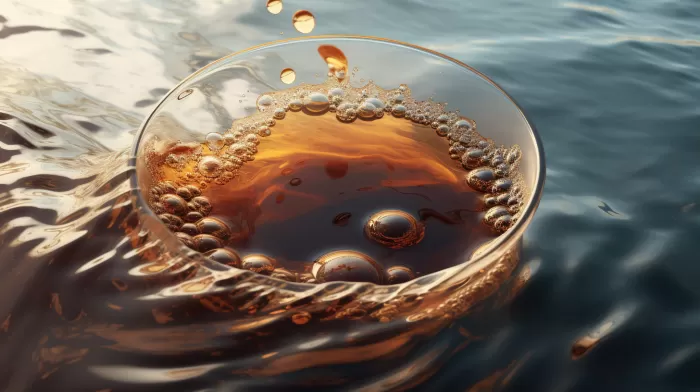Moby Dick’s character Starbuck met his tragic death, disappearing into the ocean after his ship was sunk by a gigantic whale. In today’s world, we see Starbuck(s) vanishing into the ocean, but alongside it, a surprising and unexpected residue resulting from our love for coffee, tea and energy drinks: caffeine.
Recent research from Portland State University discovered that human activity is contaminating ocean waters with measurable amounts of caffeine. They collected samples from the Pacific Ocean off the Oregon coast, revealing shockingly high levels of this contamination.
Initially, the researchers believed that caffeine pollution would mostly occur in areas near wastewater treatment plants, major population centers, or where rivers and streams empty into the ocean. However, they were surprised to find caffeine in ocean waters in areas farther from the predicted locations. This suggests that while wastewater plants might effectively remove numerous pollutants from water, septic tanks and sewer overflows still allow large quantities of contaminants, like caffeine, to enter the ocean.
Wastewater Treatment Plants Are Not the Primary Source
Elise Granek, one of the researchers involved in the study, says, “Our study findings indicate that, contrary to our prediction, wastewater treatment plants are not a major source of caffeine to coastal waters. However, onsite waste disposal systems may be a significant contributor to contaminants in Oregon’s coastal ocean and need to be better studied to fully comprehend their contribution to pollution of ocean waters.”
Caffeine, found in various beverages and pharmaceuticals consumed by humans, is not just a stimulant we rely on to stay awake and alert, but is also a drug. Its presence in the ocean is concerning, and it raises the question of whether other drugs consumed by humans could also be making it into the water.
The Effects of Caffeine on Marine Life
Researchers from the University of Corunna in Spain found that various aquatic animals, including mussels, shrimp, and crab, all ingest caffeine when exposed to it in controlled laboratory conditions. This raises concerns about the potential effects of oceanic caffeine pollution on marine organisms, especially considering their level of accumulation in the food chain.
Although the ocean’s vastness can dilute caffeine concentrations, it is still essential to understand how caffeine pollution could impact the marine ecosystem, including the potential disturbance of complex biological processes in aquatic animals.
Considering Other Contaminants
The discovery of caffeine pollution serves as a reminder that our daily habits and actions could potentially cause harm to the environment, even indirectly. Beyond caffeine, consider the various pollutants from boats, the oil industry, littering, and even human waste directly entering the ocean.
Moreover, some bath and body products contain non-environmentally friendly ingredients, such as microplastics and palm oil. Studies have also discovered harm caused by harmful algal blooms, often spurred by fertilizers, and damage caused by excessive nutrients or chemical substances in our ocean waters. Coral reefs, critically important for protecting coastal zones from storms, have also suffered immense damage due to pollution.
Taking Steps Towards a Cleaner Ocean
While the primary responsibility for addressing ocean pollution lies with governments and organizations, individuals can do their part to contribute to cleaner oceans.
- Reduce plastic use: Sturdy materials like glass, reusable silicone, or metal containers are more environmentally friendly alternatives to single-use plastic.
- Pick up litter: Picking up litter prevents it from reaching waterways and eventually the ocean. Participating in beach clean-ups or even just cleaning up your neighborhood helps reduce the amount of waste entering marine ecosystems.
- Choose eco-friendly products: Read product labels and choose products that are biodegradable, non-toxic, and not tested on animals to protect our environment.
- Support water waste regulations: Advocate for and support improved water sanitation infrastructure and policies to ensure proper waste treatment and prevent pollutants from entering the ocean.
With collective actions, we can help address this concerning situation of caffeine pollution in the ocean, which ultimately affects the well-being of human populations and marine life across the world.



